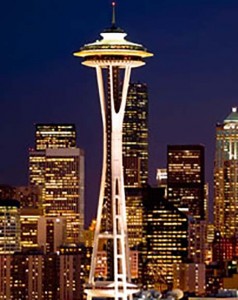by Dave Workman | Senior Editor
 Seattle City Attorney Pete Holmes has confirmed that the City of Seattle is getting free legal assistance from a high-powered international law firm to fight a lawsuit filed by three major Second Amendment groups against the city’s so-called “gun violence tax.”
Seattle City Attorney Pete Holmes has confirmed that the City of Seattle is getting free legal assistance from a high-powered international law firm to fight a lawsuit filed by three major Second Amendment groups against the city’s so-called “gun violence tax.”
The lawsuit, filed by the Second Amendment Foundation, National Rifle Association and National Shooting Sports Foundation, alleges the city adopted the tax in violation of Washington’s 32-year-old preemption law. The three organizations are joined by two Seattle gun dealers and two private citizens in a case known as Watson v. City of Seattle (See related story on Page 5).
In a press release responding to the lawsuit, Holmes stated, “The NRA doesn’t get to come into our city and tell our elected officials that they lack the authority in Washington state to tax businesses that sell a product that, when misused, so dearly costs our constituents, most of them young people.”
The NRA has tens of thousands of Evergreen State members, many of whom reside in Seattle, one of the plaintiffs noted in response. The organization, therefore, has every right and a responsibility to represent its members, activists argue.
Washington’s model preemption law was adopted in 1982, amended and strengthened in 1985 and amended more recently in 1994. Here’s what it says:
“The state of Washington hereby fully occupies and preempts the entire field of firearms regulation within the boundaries of the state, including the registration, licensing, possession, purchase, sale, acquisition, transfer, discharge, and transportation of firearms, or any other element relating to firearms or parts thereof, including ammunition and reloader components. Cities, towns, and counties or other municipalities may enact only those laws and ordinances relating to firearms that are specifically authorized by state law, as in RCW 9.41.300, and are consistent with this chapter. Such local ordinances shall have the same penalty as provided for by state law. Local laws and ordinances that are inconsistent with, more restrictive than, or exceed the requirements of state law shall not be enacted and are preempted and repealed, regardless of the nature of the code, charter, or home rule status of such city, town, county, or municipality.”
SAF founder and Executive Vice President Alan Gottlieb contended that this language removes all questions about the Legislature’s intent 32 years ago.
But the city apparently believes that with the help of attorneys from Steptoe & Johnson LLP, they can somehow get around it. The city is arguing that it has the authority under state law to pass a sales tax, even on firearms.
But Gottlieb told TGM that’s the same position the city took back in 2009 when then-Mayor Greg Nickels—a founding member of Michael Bloomberg’s Mayors Against Illegal Guns—tried to push through an administrative rule banning firearms in city park facilities. That effort was challenged by SAF, NRA, the Citizens Committee for the Right to Keep and Bear Arms, the Washington Arms Collectors and five individual plaintiffs.
The city initially lost in King County Superior Court, and then by a unanimous ruling in the State Court of Appeals. When the city sought review of the case by the state Supreme Court, the appeal was rejected. That case was known as Chan v. City of Seattle.
The Associated Press and Seattle’s KOMO 4 News reported that Steptoe & Johnson “has 500 lawyers around the world and specializes in complex litigation.” That’s quite a lineup against the attorneys representing SAF, NRA and NSSF; almost a David v. Goliath contest.
In his press statement, Holmes asserted that, “Gun-fueled tragedies like Sandy Hook, where 20 children and six school staff were slaughtered, ironically result in a stampede to buy even more weapons. It’s a pattern seen over and over again, apparently out of the misplaced fear that government would step in to curtail gun sales.”
However, Gottlieb contended that any time you slap an additional $25 tax on a firearm, or add a nickel tax to the sale of each round of centerfire ammunition, that not only could “curtail” firearms and ammunition sales, it might chill them altogether, and drive shoppers out of the city.
Holmes’ release also noted that “the Harborview Injury Prevention and Research Center in Seattle delivered a report on the predictors and consequences of firearm violence in King County that found that individuals hospitalized for a firearm injury are 30 times more likely to be re-hospitalized for another firearm injury than people admitted to the hospital for non-injury reasons.”
What the press release didn’t mention, but the Executive Summary of the report strongly suggested, is that Seattle may have a criminal problem rather than a gun problem. That 2014 report noted that in 2006-07, there were 222 hospitalizations for “firearm-related injuries” in King County.
“One quarter of individuals hospitalized with a gunshot wound were arrested within the next 5 years for a violent or gun-related crime,” the report revealed. “More than 45% of individuals hospitalized with gunshot wounds or injuries due to an assault were subsequently arrested for non-violent crimes…. Individuals hospitalized with a firearm injury were twice as likely to be arrested for a violent or firearm-related crime than those admitted for a non-injury problem.”



